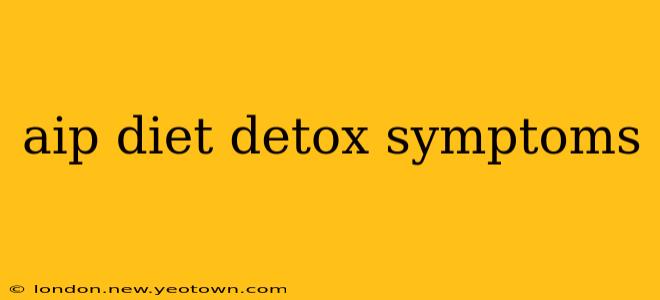Embarking on the Autoimmune Protocol (AIP) diet is a significant lifestyle change, often undertaken to address underlying autoimmune conditions. It's a restrictive elimination diet, and as your body adjusts, you might experience a range of detox symptoms. Think of it like this: you're giving your body a deep clean, and just like any spring cleaning, there might be some initial dust and disruption before the shine emerges. This isn't necessarily a bad thing – in fact, these symptoms often signal that the diet is working to eliminate inflammatory triggers. Let's delve into what you might expect.
What are the Common AIP Detox Symptoms?
The AIP diet focuses on removing common inflammatory foods like dairy, nightshades, gluten, grains, legumes, eggs, and processed foods. This removal can trigger a variety of responses as your body adapts. Don't panic if you experience some of these; it's a common part of the process.
Here are some common detox symptoms:
- Headaches: These can be a result of sugar withdrawal, caffeine withdrawal (if you were a regular consumer), or the body's initial adjustment to removing inflammatory foods.
- Fatigue: Similar to headaches, fatigue can be caused by sugar withdrawal, nutrient deficiencies, or your body working hard to heal and detoxify.
- Brain fog: This can also result from removing inflammatory foods and/or nutrient deficiencies, impacting cognitive function.
- Digestive upset: This is extremely common, particularly in the early stages of the diet as your gut microbiome adjusts to the new food regimen. Expect bloating, gas, constipation or diarrhea.
- Skin changes: This could manifest as breakouts, dryness, or temporary worsening of existing skin conditions. Think of it as your skin flushing out toxins.
- Muscle aches and pains: This is less common, but your body might experience some aches as it adjusts to the removal of inflammatory foods.
How Long Do AIP Detox Symptoms Last?
The duration of these symptoms varies from person to person. For some, they might only last a few days or weeks, while for others, it could extend to a couple of months. It's crucial to remember that this is a temporary phase. As your body adapts and heals, the intensity and frequency of these symptoms will gradually decrease.
Are AIP Detox Symptoms a Sign That It's Not Working?
Not necessarily! The presence of detox symptoms often indicates that the body is reacting to the removal of inflammatory triggers. However, if symptoms are severe or persist for an extended period, it's advisable to consult with a healthcare professional or registered dietitian. They can help assess your situation, determine if there are other underlying issues, and make appropriate recommendations.
What Can I Do to Ease AIP Detox Symptoms?
While you might not be able to completely eliminate the symptoms, you can take steps to lessen their impact.
- Hydration is key: Drink plenty of water throughout the day to support detoxification and flush out toxins.
- Electrolyte balance: Replenish electrolytes lost through sweating and digestive changes by consuming bone broth, coconut water, or electrolyte supplements (under a healthcare professional's guidance).
- Rest and relaxation: Get adequate sleep to support your body's healing processes.
- Gentle exercise: Light exercise like walking can help to support detoxification, but avoid strenuous activity during the initial phase.
- Listen to your body: If you're experiencing severe symptoms, it's okay to take a break or modify the diet slightly with your healthcare professional's guidance.
Is it Normal to Feel Worse Before Feeling Better on AIP?
Yes, absolutely. The Herxheimer reaction is a common phenomenon experienced during various detoxification processes. This involves a temporary worsening of symptoms as your body eliminates toxins and pathogens. It signifies that the body is working, flushing out the inflammatory triggers that were previously contributing to your autoimmune condition.
Remember, the AIP diet is a journey, not a race. Be patient with yourself, listen to your body, and seek professional guidance when needed. The potential long-term benefits of managing your autoimmune condition far outweigh the temporary discomfort of the initial detox phase. By focusing on a nutrient-rich diet and supporting your body, you'll be well on your way to improved health and well-being.

